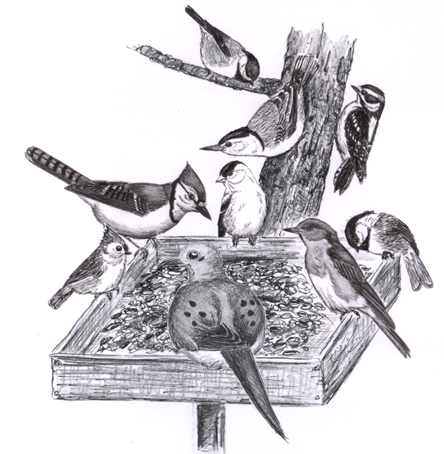
Dear Bird Folks:
After being away from our Cape home for long periods, the first thing that we do is fill our bird feeders. Within hours, the birds are back feeding. The question is: How do the birds know that the feeders are filled? Why, after finding our feeders empty for so long, don’t the birds put us on a black list and totally give up on us ? I have asked this question to many so-called birders who can’t answer it. I now pose this question to the only people who can.
-Schatze, Bronxville, NY and Dennis, MA
Oh My Goodness Schatze, With all of the topflight birders and naturalists in this area, you are depending on us for your answer? Whoa, talk about pressure. However, you are right not to put any value in information provided by the “so-called birders”. You can’t trust what those guys say. Trying to learn something from so-called birders is like trying to get accurate information from Fox News. It’s just not going to happen.
The first thing to keep in mind is that birds don’t have a lot to do all day. They don’t have tax forms to fill out, meetings to attend or dogs to walk. This time of year the only thing written in their daily to-do calendar, is to find something to eat and that’s it. Oh sure, there is the occasional pedicure or yoga class, but mostly they are focused on finding food. Their two major sense organs, eyes and ears, are working overtime trying to locate their next meal. If they aren’t able to visually locate food themselves, their ears are listening for the sounds that other birds make when they find food.
Don’t take this personally, but your birds don’t trust you and that has nothing to do with you being from New York. Birds learned long ago that no source of food is permanent. In nature things change and birds can’t allow themselves to depend on anything. Your yard is simply one of many places that birds check for food. If your feeders are empty they move on. Sure they may curse and take a bit of an attitude, but deep down they understand and won’t hold a grudge. If your feeders are full, they will stop, eat for a bit, but then possibly continue on, never allowing themselves to be dependent.
Banding studies have indicated that what we think of as “our birds” may actually be different moving flocks of birds, that just look like the same regular birds. Years ago I remember reading about a study in which finches were netted and banded. In the course of one winter, one yard and one feeder was visited by thousands of different finches. Even though only a few were seen on any given day, various flocks of similar looking birds would show up every few days. After filling your feeders for the first time in a while and thinking that your birds are “back”, it is quite possible that the birds on your feeder have never even been in your yard before. You may be seeing a roving flock stopping for the first time.
Still other birds, like our old pals the chickadees, don’t fall into this wandering random category. The chickadees you are seeing now are the same ones that you saw last week and the week before that. Just like many of the less ambitious kids from your high school, most chickadees spend their entire life fairly close to where they were hatched. In the fall, chickadees form small flocks of six to ten birds, establish a twenty acre wintering territory and rarely leave it. Thus, “your” chickadees are also your neighbor’s chickadees. Even the creepy neighbor, the one who nobody likes, could be feeding the same chickadees as you are.
When chickadees find food, they verbally pass this information on to others in their flock. It could be that these chickadees, the birds that know the ‘hood the best, are the ones that inadvertently alert other birds that you are back, your feeders are filled and dinner is served.
Don’t worry about being away in New York Schatze, the birds in Dennis will always return and will never put you on a black list. Not unless they see a Yankee bumper sticker on your car. Then you’ll be on their S-list and you’ll be washing your car over and over and over.